6 july 2015
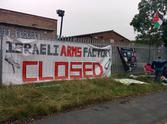
On Monday July 6th, Palestinians and their supporters around the world marked the one year invasion of the Israeli attack on Gaza that ended up lasting fifty one days and costing close to twenty five hundred Palestinian lives.
In Britain today, hundreds of activists held protests and occupied three different weapon factories located on british soil that are directly involved in the Israeli occupation of Palestinian land. There were simultaneous protests held in Australia, at branches of the same companies.
The companies are Elbit Systems in Staffordshire, an Israeli company which manufactures armored drones, Instro Precision in Kent and U.A.V. Engines in Lichfield, which manufactures drone engines for export to Israel. The activists say that these weapons are used by Israel to target and massacre civilians in Gaza.
Elbit Systems is Israel’s largest publicly traded weapons company. The company has military contracts with numerous governments, including the US and UK.
According to the Electronic Intifada, “The Shenstone and Broadstairs factories have been targeted by protesters before. At the height of Israel’s 51-day assault last year, nine protesters staged a sit-in on the roof of the UEL factory, closing it for two days in August before they were arrested. Rooftop protesters shut down the Instro Precision factory in Kent for a day in February, with no arrests made.”
A report from Amnesty International stated that, “UAV Engines Ltd (UEL), based near Birmingham, has stated that it manufactures the engines for Hermes 450 UAVs (Unmanned Airborne Vehicles) produced by its parent company, Elbit Systems of Israel. Specifications displayed by Elbit Systems beside a Hermes 450 vehicle at a 2006 defence exhibition, of which we have photographs, also state that the Hermes 450 is powered by a ‘UEL AR-80-1010’ engine, made by UAV Engines Ltd.
“Hermes 450s are described by their manufacturer as ‘the backbone of Israeli army and air force ISTAR [Intelligence, Surveillance, Target Acquisition And Reconnaissance] missions’. They have reportedly been deployed for surveillance and targeting missions in Gaza prior to 2006, and were reportedly central to IDF operations in Gaza and Lebanon during 2006. Defence media shortly after the 2006 conflict quoted Israeli Air Force sources discussing the performance of the Israeli Air Force Hermes 450’s ‘50hp (40kW) UEL engine’.”
“A spokesperson for Elbit Systems has denied to British media that UK-made engines are incorporated into the Hermes 450s used by the Israeli armed forces. But the evidence looks pretty convincing.”
At least ten people were arrested at the British protests on Monday, July 6th, 2015.
In Britain today, hundreds of activists held protests and occupied three different weapon factories located on british soil that are directly involved in the Israeli occupation of Palestinian land. There were simultaneous protests held in Australia, at branches of the same companies.
The companies are Elbit Systems in Staffordshire, an Israeli company which manufactures armored drones, Instro Precision in Kent and U.A.V. Engines in Lichfield, which manufactures drone engines for export to Israel. The activists say that these weapons are used by Israel to target and massacre civilians in Gaza.
Elbit Systems is Israel’s largest publicly traded weapons company. The company has military contracts with numerous governments, including the US and UK.
According to the Electronic Intifada, “The Shenstone and Broadstairs factories have been targeted by protesters before. At the height of Israel’s 51-day assault last year, nine protesters staged a sit-in on the roof of the UEL factory, closing it for two days in August before they were arrested. Rooftop protesters shut down the Instro Precision factory in Kent for a day in February, with no arrests made.”
A report from Amnesty International stated that, “UAV Engines Ltd (UEL), based near Birmingham, has stated that it manufactures the engines for Hermes 450 UAVs (Unmanned Airborne Vehicles) produced by its parent company, Elbit Systems of Israel. Specifications displayed by Elbit Systems beside a Hermes 450 vehicle at a 2006 defence exhibition, of which we have photographs, also state that the Hermes 450 is powered by a ‘UEL AR-80-1010’ engine, made by UAV Engines Ltd.
“Hermes 450s are described by their manufacturer as ‘the backbone of Israeli army and air force ISTAR [Intelligence, Surveillance, Target Acquisition And Reconnaissance] missions’. They have reportedly been deployed for surveillance and targeting missions in Gaza prior to 2006, and were reportedly central to IDF operations in Gaza and Lebanon during 2006. Defence media shortly after the 2006 conflict quoted Israeli Air Force sources discussing the performance of the Israeli Air Force Hermes 450’s ‘50hp (40kW) UEL engine’.”
“A spokesperson for Elbit Systems has denied to British media that UK-made engines are incorporated into the Hermes 450s used by the Israeli armed forces. But the evidence looks pretty convincing.”
At least ten people were arrested at the British protests on Monday, July 6th, 2015.
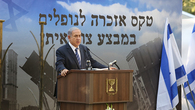
Israel honors Protective Edge fallen in state ceremony on Mount Herzl; President Rivlin warns Palestinians: 'When there is no fire towards Israel - then there will be no fire towards the Gaza Strip'.
Prime Minister Benjamin Netanyahu on Monday had a message to Israel's enemies, saying "those who try to hurt us, their blood be on their own heads."
Netanyahu was speaking at a state ceremony honoring the 67 soldiers and officers and five civilians who were killed during Operation Protective Edge last summer in Gaza.
His warning was aimed not just at Hamas, but also at Hezbollah, Iran and the Islamic State. "We're closely monitoring the situation in the south and preparing to act with force when required to do so," he said, as southern residents have been suffering for several weeks from sporadic rocket fire from the Gaza Strip and recently from the Sinai Peninsula as well.
Turning to bereaved families, Netanyahu said that "In every meeting and every conversation I had with you, one sentence kept coming back, 'I'm feeling great pain in my heart, but also great pride'. I know well that there is no end to your grief, but alongside this you have the knowledge that your sons' bravery saved many lives in Israel."
President Rivlin noted the suffering of Israeli citizens throughout the war and before it, under threat from rockets and terror tunnels. He also paid tributed to the fallen soldiers and their families, and to wounded soldiers still leading a daily battle to rehabilitate. However, Rivlin noted that Israel's mission remains incomplete. "We are still yet to see the return of two of our sons; Staff Sergeant Oron Shaul, and Lt. Hadar Goldin. We shall not rest till we bring them for burial in Israel," he vowed.
Noting recent rocket and terror attacks, the president said that, "We are not a people of war, but if forced to take up arms to defend our borders and our existence we will not hesitate to do so.
"The State of Israel cannot continue to be held hostage by an enemy which operates in the heart of their civilian population. An enemy which does not respect human rights, which does not respect human life, an enemy which scorns international law and democracy," he added. "Only the eradication of terror will bring an end to the murder of innocents on both sides," he stressed, adding that "When there is no fire towards Sderot, Nahal Oz, Nir Banim, Ashdod or Ashkelon - then there will be no fire towards the Gaza Strip."
Alongside Rivlin and Netanyahu, the ceremony was also attended by Defense Minister Moshe Ya'alon and IDF Chief of Staff Gadi Eisenkot as well as bereaved families, Israeli politicians from both coalition and opposition, and other dignitaries.
Prime Minister Benjamin Netanyahu on Monday had a message to Israel's enemies, saying "those who try to hurt us, their blood be on their own heads."
Netanyahu was speaking at a state ceremony honoring the 67 soldiers and officers and five civilians who were killed during Operation Protective Edge last summer in Gaza.
His warning was aimed not just at Hamas, but also at Hezbollah, Iran and the Islamic State. "We're closely monitoring the situation in the south and preparing to act with force when required to do so," he said, as southern residents have been suffering for several weeks from sporadic rocket fire from the Gaza Strip and recently from the Sinai Peninsula as well.
Turning to bereaved families, Netanyahu said that "In every meeting and every conversation I had with you, one sentence kept coming back, 'I'm feeling great pain in my heart, but also great pride'. I know well that there is no end to your grief, but alongside this you have the knowledge that your sons' bravery saved many lives in Israel."
President Rivlin noted the suffering of Israeli citizens throughout the war and before it, under threat from rockets and terror tunnels. He also paid tributed to the fallen soldiers and their families, and to wounded soldiers still leading a daily battle to rehabilitate. However, Rivlin noted that Israel's mission remains incomplete. "We are still yet to see the return of two of our sons; Staff Sergeant Oron Shaul, and Lt. Hadar Goldin. We shall not rest till we bring them for burial in Israel," he vowed.
Noting recent rocket and terror attacks, the president said that, "We are not a people of war, but if forced to take up arms to defend our borders and our existence we will not hesitate to do so.
"The State of Israel cannot continue to be held hostage by an enemy which operates in the heart of their civilian population. An enemy which does not respect human rights, which does not respect human life, an enemy which scorns international law and democracy," he added. "Only the eradication of terror will bring an end to the murder of innocents on both sides," he stressed, adding that "When there is no fire towards Sderot, Nahal Oz, Nir Banim, Ashdod or Ashkelon - then there will be no fire towards the Gaza Strip."
Alongside Rivlin and Netanyahu, the ceremony was also attended by Defense Minister Moshe Ya'alon and IDF Chief of Staff Gadi Eisenkot as well as bereaved families, Israeli politicians from both coalition and opposition, and other dignitaries.

President, prime minister, IDF chief and defense minister attend memorial for 67 soldiers and 5 civilians killed in last summer's war in Gaza.
Israel on Monday marks one year since the beginning of Operation Protective Edge in Gaza with a state ceremony honoring the 67 soldiers and officers and five civilians who were killed during the 50 days of fighting.
President Reuven Rivlin, Prime Minister Benjamin Netanyahu, Defense Minister Moshe Ya'alon and IDF Chief of Staff Gadi Eisenkot were all scheduled to attend the ceremony at the Mount Herzl cemetery in Jerusalem.
Israel on Monday marks one year since the beginning of Operation Protective Edge in Gaza with a state ceremony honoring the 67 soldiers and officers and five civilians who were killed during the 50 days of fighting.
President Reuven Rivlin, Prime Minister Benjamin Netanyahu, Defense Minister Moshe Ya'alon and IDF Chief of Staff Gadi Eisenkot were all scheduled to attend the ceremony at the Mount Herzl cemetery in Jerusalem.
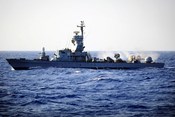
The Israeli occupation navy has committed up to 1,182 violations against Palestinian fishermen since Israel accepted an Egyptian-brokered truce in Gaza last year, according to the local fishermen committees.
In a recent report, the committees, which is an affiliate of the agricultural union, said that Israel still restricts the work of Gaza fishermen within 85 percent of the permitted fishing zone in violation of the understandings it had agreed on under the last ceasefire deal.
According to its report, the Israeli naval forces kidnapped last June 15 fishermen, wounded 10 others and partially destroyed three fishing boats.
The navy also confiscated one tug boat and dozens of fishing kits and caused damage to many fishing nets.
In a recent report, the committees, which is an affiliate of the agricultural union, said that Israel still restricts the work of Gaza fishermen within 85 percent of the permitted fishing zone in violation of the understandings it had agreed on under the last ceasefire deal.
According to its report, the Israeli naval forces kidnapped last June 15 fishermen, wounded 10 others and partially destroyed three fishing boats.
The navy also confiscated one tug boat and dozens of fishing kits and caused damage to many fishing nets.
5 july 2015
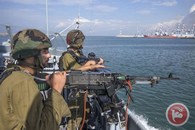
Israeli naval forces opened fire on Palestinian fishermen in several locations off the coast of the Gaza Strip with no injuries reported, witnesses said.
Fishermen said their fishing boats came under fire off the coast of al-Waha northwest of Beit Lahiya in the northern Gaza Strip. Separately, Israeli forces fired at Gaza fishermen off the coast of Sudaniyya northwest of Gaza City, as well as off the coast near Sheikh Ijlein in the central Gaza Strip.
No injuries were reported. An Israeli army spokesperson said that Israeli forces fired warning shots into the air after the boats had "deviated from the designated fishing zone," but was unable to elaborate on how far from shore the vessels were at the time of the incident.
Israeli forces have repeatedly opened fire on Palestinian fisherman and farmers since the ceasefire agreement signed Aug. 26, 2014 that ended a devastating 50-day Israeli military offensive against the Gaza Strip.
In May alone, there were a total of 51 incidents of shootings, incursions into the coastal enclave, and arrests, according to the Palestinian Center for Human Rights.
This included 41 shootings, which left nine injured, including one minor.The attacks come despite Israeli promises at the end of the ceasefire to ease restrictions on Palestinian access to both the sea and the border region near the "security buffer zone."
Fishermen said their fishing boats came under fire off the coast of al-Waha northwest of Beit Lahiya in the northern Gaza Strip. Separately, Israeli forces fired at Gaza fishermen off the coast of Sudaniyya northwest of Gaza City, as well as off the coast near Sheikh Ijlein in the central Gaza Strip.
No injuries were reported. An Israeli army spokesperson said that Israeli forces fired warning shots into the air after the boats had "deviated from the designated fishing zone," but was unable to elaborate on how far from shore the vessels were at the time of the incident.
Israeli forces have repeatedly opened fire on Palestinian fisherman and farmers since the ceasefire agreement signed Aug. 26, 2014 that ended a devastating 50-day Israeli military offensive against the Gaza Strip.
In May alone, there were a total of 51 incidents of shootings, incursions into the coastal enclave, and arrests, according to the Palestinian Center for Human Rights.
This included 41 shootings, which left nine injured, including one minor.The attacks come despite Israeli promises at the end of the ceasefire to ease restrictions on Palestinian access to both the sea and the border region near the "security buffer zone."

Deputy head of Hamas's political bureau Ismail Haneyya said that Israel had informed international parties that it would not wage a new war on the Gaza Strip.
Haneyya made his remarks after night prayers at Ashuhada'a Mosque in Nuseirat refugee camp.
The Hamas official, who did not name those parties, added that there were international parties, which supported the war on Gaza a year ago, decided recently to be open to Gaza.
He also highlighted the recent breakthrough in the relationship between his Movement and the Egyptian authorities, which contributed to changing the humanitarian situation in Gaza, affirming that there were ongoing contacts with the Egyptian side.
He expressed his optimism that the future would be promising for Gaza people.
Haneyya made his remarks after night prayers at Ashuhada'a Mosque in Nuseirat refugee camp.
The Hamas official, who did not name those parties, added that there were international parties, which supported the war on Gaza a year ago, decided recently to be open to Gaza.
He also highlighted the recent breakthrough in the relationship between his Movement and the Egyptian authorities, which contributed to changing the humanitarian situation in Gaza, affirming that there were ongoing contacts with the Egyptian side.
He expressed his optimism that the future would be promising for Gaza people.
4 july 2015
|
|
Ynet has returned to the sites of destruction and fear to document Israel's physical repair despite emotional scars that persist in the Israeli psyche.
Amidst heavy rocket fire from Hamas in Gaza and on-going retaliatory airstrikes by the IAF, Israel declared the beginning of Operation Protective Edge on July 8, 2014, nearly one year ago. The operation was intended to be quick and painful to Hamas' military capabilities, namely their tunnel infrastructure and rocket stockpiles, but quickly became a war that dragged on for 50 unpredictable days and resulted in the deaths of 67 Israeli soldiers, five Israeli civilians and more than 2,000 Palestinians. Now, one year later, Ynet has returned to the sites where destruction and |
fear brought memories of devastation back into the forefront of the nation's psyche. However, while war has a lasting effect on the mind, repairs and reconstruction have physically returned Israel to normal. Move the division marker left and right on each of the photos to see the ruins of war vs. the reality of peace.
7/11/14 A grad rocket exploded in a gas station in Ashdod, striking a fuel tank and causing massive destruction to the area on the fourth day of Operation Protective Edge. One man was seriously wounded in the strike and five others were lightly wounded. The first 500 rockets fired by Hamas didn't cause any damage or serious injuries partly because of the success of Israel's Iron Dome anti-missile battery.
7/12/14 This house in Be'er Sheva suffered a direct hit from rocket fire, wounding an 86-year-old woman. Be'er Sheva is a prime target for Hamas militants due to its status as a significant city with a large population and its proximity to the Gaza Strip.
7/14/14 Tourists and Israeli beach-goers in Tel Aviv also experienced daily rocket fire for the first time in decades during Protective Edge. Beach-side hotels and businesses ushered the public into shelters within their establishments.
7/23/14 Throughout southern Israel, those traveling in vehicles were instructed to take cover on the ground during air raid sirens, as vehicles could potentially become death traps if hit by a rocket.
8/21/14 One man was moderately wounded by shrapnel when a rocket struck this home in Kibbutz Nir Oz in the Eshkol Regional Council. Nine soldiers and four-year-old Daniel Tregerman were killed by mortars fired on Eshkol and Sha'ar HaNegev.
8/26/14 Children were also under threat from the indiscriminate rocket fire as seen by the hole in a day care in Ashdod. On the same day, the last of the operation, rockets were fired at central Israel, Ashkelon and Ashdod.
While peace has mostly been maintained over the last year, rocket fire from Gaza and possibly Sinai has returned to southern Israel of the last few weeks, though the perpetrators appear to be ISIS militants opposed to Hamas' rule in the enclave.
7/11/14 A grad rocket exploded in a gas station in Ashdod, striking a fuel tank and causing massive destruction to the area on the fourth day of Operation Protective Edge. One man was seriously wounded in the strike and five others were lightly wounded. The first 500 rockets fired by Hamas didn't cause any damage or serious injuries partly because of the success of Israel's Iron Dome anti-missile battery.
7/12/14 This house in Be'er Sheva suffered a direct hit from rocket fire, wounding an 86-year-old woman. Be'er Sheva is a prime target for Hamas militants due to its status as a significant city with a large population and its proximity to the Gaza Strip.
7/14/14 Tourists and Israeli beach-goers in Tel Aviv also experienced daily rocket fire for the first time in decades during Protective Edge. Beach-side hotels and businesses ushered the public into shelters within their establishments.
7/23/14 Throughout southern Israel, those traveling in vehicles were instructed to take cover on the ground during air raid sirens, as vehicles could potentially become death traps if hit by a rocket.
8/21/14 One man was moderately wounded by shrapnel when a rocket struck this home in Kibbutz Nir Oz in the Eshkol Regional Council. Nine soldiers and four-year-old Daniel Tregerman were killed by mortars fired on Eshkol and Sha'ar HaNegev.
8/26/14 Children were also under threat from the indiscriminate rocket fire as seen by the hole in a day care in Ashdod. On the same day, the last of the operation, rockets were fired at central Israel, Ashkelon and Ashdod.
While peace has mostly been maintained over the last year, rocket fire from Gaza and possibly Sinai has returned to southern Israel of the last few weeks, though the perpetrators appear to be ISIS militants opposed to Hamas' rule in the enclave.
1 july 2015
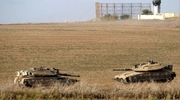
Several Israeli bulldozers, Wednesday morning, carried out a limited incursion to the east of Deir al-Balah, near Abu Mutabiq and east of Maghazi, in the central Gaza Strip.
According to Al Ray, media sources reported that six Israeli bulldozers moved out of the military site of Kosufem, and swept Palestinian lands in the presence of Israeli military vehicles and drones.
The army opened intermittent fire toward Palestinian agricultural lands, with no injuries reported.
Israeli forces frequently carry out incursions along the border areas of Gaza, razing lands under the pretext of preventing any suspected resistance activities.
According to Al Ray, media sources reported that six Israeli bulldozers moved out of the military site of Kosufem, and swept Palestinian lands in the presence of Israeli military vehicles and drones.
The army opened intermittent fire toward Palestinian agricultural lands, with no injuries reported.
Israeli forces frequently carry out incursions along the border areas of Gaza, razing lands under the pretext of preventing any suspected resistance activities.
30 june 2015
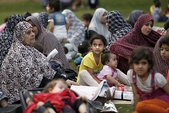
Gaza residents during Operation Protective Edge
Residents fear speaking out against regime amid massive financial crisis, with half saying they would consider emigration -- but no alternative has emerged.
Emad Firi is angry. During last summer's Israel-Hamas war, a shell slammed through the roof of his house and shredded his right leg. Unable to work, Firi's son now drives his taxi but the family struggles to survive.
The 50-year-old blames Israel, but also the Islamic militant group Hamas that has ruled Gaza since a violent takeover in 2007. In the Hamas era, the tiny territory has endured three wars with Israel and a crippling Israeli-Egyptian border blockade that keeps most of its 1.8 million residents trapped.
"Who is not angry about this difficult situation?" Firi said, waiting at a rehabilitation clinic to finally to be fitted with an artificial leg.
But the people of Gaza won't rise up -- some out of fear, he said. "If I say two words, I may go to prison," he says, as Hamas has little tolerance for dissent and often detains critics. "So we stay silent."
A year after the most destructive war in Gaza yet, Hamas remains in control -- despite signs of mounting frustration and a poll indicating half the residents would emigrate if borders were open.
No alternative to Hamas rule has emerged, after deep-seated rivalries between Hamas and Palestinian President Mahmoud Abbas derailed attempts to set up a unity government in both the West Bank and Gaza.
Hamas can also rely on unwavering support from about one-third of the population, polls indicate.
At the same time, Israel and Egypt have signaled a policy shift, from trying to weaken and perhaps topple Hamas, including by enforcing the blockade over the past eight years, to containing the group.
Egypt's military temporarily opened the border crossing with Gaza in recent days. Thousands left Gaza for the first time in months, while shipments of desperately-needed cement entered the territory. Egypt said it acts according to changing security assessments, while Hamas officials said they were promised a further easing.
Meanwhile, Israel relaxed its stringent movement restrictions for Gaza residents, amid reports that foreign diplomats are carrying messages between Israel and Hamas on a long-term cease-fire deal.
Israeli officials have also struck a new tone. The outgoing top army commander dealing with Gaza, Maj. Gen. Sami Turgeman, has said recently that Israel and Hamas have some shared interests, while leading right-wing Cabinet Minister Naftali Bennett said the Hamas presence in Gaza is a reality. It's not a matter of reconciling with it (Hamas rule) or not," he told Israeli TV's Channel 2 over the weekend. "I see that they (Hamas) are there."
Israel and the West have branded Hamas, which is sworn to Israel's destruction, as a terror group.
Salah Bardawil, a Hamas spokesman, said he believes Egypt and Israel have become "more realistic." They "realized that they can't reach their goals by violence and force," he said.
Hamas' biggest problem currently is lack of funds, after Egypt shut down hundreds of smuggling tunnels under its border with Gaza two years ago. The tunnels delivered cheap fuel and cement, powering key sectors of the economy, while Hamas earned tens of millions a year taxing the smuggled goods.
The tunnel closures triggered Hamas' worst-ever financial crisis, leaving it unable to cover its $30 million-a-month payroll for 40,000 civil servants and security forces.
Last year, Hamas agreed to step aside in Gaza for a "national consensus government" led by Abbas -- whose forces were defeated by Hamas in 2007 -- in hopes of solving the cash crisis. Yet disputes prevented the government from taking control in Gaza.
Since May, Hamas, which is believed to receive aid from Iran, has stepped up its hunt for new revenues.
It has imposed new import fees on goods entering Gaza through the Kerem Shalom crossing with Israel, including a 25 percent custom on cars.
Ziad Zaza, a former Hamas finance minister, said Abbas' government in the West Bank earns about $80 million a month in customs from the crossing -- money Hamas feels should flow into its coffers.
Gaza traders, already paying 50 percent in car customs to Abbas, had to comply after Hamas held up 265 cars at the crossing. Ismail Abu Nakhala of the importers' association said Hamas stands to make almost $1 million a month from the new fees.
Gaza City car dealer Alaa Badwan expects a drop in business since retail prices are bound to rise. "In this situation (in Gaza), there is no room for additional taxes," he said.
Half the work force is unemployed. It doesn't help that large firms and other potential employers are often hampered by politics.
Hamas demands taxes from large West Bank-based firms with branches in Gaza, such as telecoms operator Jawwal. Last week, the Gaza attorney general threatened to close the Jawwal headquarters in Gaza unless the company pays up. Meanwhile, company officials have said Abbas' government asked them not to pay taxes to Hamas.
Despite rising prices and potential backlash from higher taxes, a former Hamas official said the group has to raise money to provide services in Gaza, including security.
"We collect the minimum to survive," former official Ahmed Yousef said. Zaza mainly blamed price hikes on Gaza's involuntary switch from cheap Egyptian fuel smuggled through tunnels to pricier Israeli gas.
Market vendor Abu Maher Mourtaga said business is down because of the double burden of rising prices and a drop in purchasing power. At his stall, the price of nuts is up 50 percent from last year, now $15 a kilogram (about $6.80 a pound). A five kilogram (11 pound) box of dates is now $16, compared to $13 a year ago.
A June poll by the independent Palestinian Center for Policy and Survey Research reflected growing frustration. Fifty percent of Gaza residents are considering emigration, up five points from previous surveys, and 63 percent are dissatisfied with the results of war, said the survey among 1,200 people with an error margin of 3 percentage points.
During the 50 days of fighting, which began July 8, Israel launched more than 6,000 airstrikes against Gaza, while Hamas fired more than 6,600 rockets and mortars at Israel.
The war killed more than 2,200 Palestinians, mostly civilians, and damaged or destroyed 141,000 homes, according to UN figures. Israel counted 73 deaths, including six civilians.
A recent UN investigation concluded there's suspicion both sides committed war crimes, pointing to indiscriminate Gaza rocket attacks on Israel and heavy Israeli firepower used in densely populated Gaza areas.
United Nations officials say the pace of reconstruction is too slow, with no homes being rebuilt from the ground up yet. Roberto Valent, local head of the UN Development Program, blamed the slow flow of foreign aid and curbs on building material imports dictated by Israeli security concerns.
Tens of thousands are still displaced, while others live in damaged apartments.
"Siege is siege and nothing has changed," said Fadi Jundia, 29, who lives with 12 people on the damaged ground floor of his family home in Gaza City, after the upper floors were destroyed by shelling. "We went back 100 years."
Some make a meager living from the rubble, with less than half of the 2 million tons of war debris removed so far. Maisera Khouli, 24, collects rubble with his donkey cart, selling each of his three or four daily loads for $1.25. With food for the donkey costing $2.50 a day, there's little left over. Khouli said he'd gladly leave Gaza for a decent job.
What construction there is eases public pressure on Hamas.
A new housing complex being built on former Jewish settlement lands is funded by Qatar, the biggest foreign donor to Gaza. Qatar is supervising the $140 million project directly, rather than going through Hamas. Still, the construction of 3,600 apartments -- along with two four-lane highways Qatar is paving -- creates jobs and meets local needs.
While many are struggling, Hamas takes care of its own businesses.
Its Al Aqsa TV station, destroyed by an Israeli strike, was swiftly rebuilt for $600,000. Bardawil, the Hamas spokesman and head of the station, said Al Aqsa even managed to produce a 30-part series, "Freedom Fighter," for $100,000 in time for the holy month of Ramadan, when families watch TV serials together after breaking their daily dawn-to-dusk fast.
As in previous crises, the militants' strategy is to survive day to day and wait for a regional re-alignment that could ease its isolation. One analyst warned another war could easily erupt because restrictions on Gaza have not been lifted since Hamas gambled on war in 2014 as a way to break the border blockade.
"At present, the main actors, Hamas and Israel, don't want another war," said Nathan Thrall of the International Crisis Group think tank. "(But) in a year or two years, all policies are pushing Gaza to another war."
Residents fear speaking out against regime amid massive financial crisis, with half saying they would consider emigration -- but no alternative has emerged.
Emad Firi is angry. During last summer's Israel-Hamas war, a shell slammed through the roof of his house and shredded his right leg. Unable to work, Firi's son now drives his taxi but the family struggles to survive.
The 50-year-old blames Israel, but also the Islamic militant group Hamas that has ruled Gaza since a violent takeover in 2007. In the Hamas era, the tiny territory has endured three wars with Israel and a crippling Israeli-Egyptian border blockade that keeps most of its 1.8 million residents trapped.
"Who is not angry about this difficult situation?" Firi said, waiting at a rehabilitation clinic to finally to be fitted with an artificial leg.
But the people of Gaza won't rise up -- some out of fear, he said. "If I say two words, I may go to prison," he says, as Hamas has little tolerance for dissent and often detains critics. "So we stay silent."
A year after the most destructive war in Gaza yet, Hamas remains in control -- despite signs of mounting frustration and a poll indicating half the residents would emigrate if borders were open.
No alternative to Hamas rule has emerged, after deep-seated rivalries between Hamas and Palestinian President Mahmoud Abbas derailed attempts to set up a unity government in both the West Bank and Gaza.
Hamas can also rely on unwavering support from about one-third of the population, polls indicate.
At the same time, Israel and Egypt have signaled a policy shift, from trying to weaken and perhaps topple Hamas, including by enforcing the blockade over the past eight years, to containing the group.
Egypt's military temporarily opened the border crossing with Gaza in recent days. Thousands left Gaza for the first time in months, while shipments of desperately-needed cement entered the territory. Egypt said it acts according to changing security assessments, while Hamas officials said they were promised a further easing.
Meanwhile, Israel relaxed its stringent movement restrictions for Gaza residents, amid reports that foreign diplomats are carrying messages between Israel and Hamas on a long-term cease-fire deal.
Israeli officials have also struck a new tone. The outgoing top army commander dealing with Gaza, Maj. Gen. Sami Turgeman, has said recently that Israel and Hamas have some shared interests, while leading right-wing Cabinet Minister Naftali Bennett said the Hamas presence in Gaza is a reality. It's not a matter of reconciling with it (Hamas rule) or not," he told Israeli TV's Channel 2 over the weekend. "I see that they (Hamas) are there."
Israel and the West have branded Hamas, which is sworn to Israel's destruction, as a terror group.
Salah Bardawil, a Hamas spokesman, said he believes Egypt and Israel have become "more realistic." They "realized that they can't reach their goals by violence and force," he said.
Hamas' biggest problem currently is lack of funds, after Egypt shut down hundreds of smuggling tunnels under its border with Gaza two years ago. The tunnels delivered cheap fuel and cement, powering key sectors of the economy, while Hamas earned tens of millions a year taxing the smuggled goods.
The tunnel closures triggered Hamas' worst-ever financial crisis, leaving it unable to cover its $30 million-a-month payroll for 40,000 civil servants and security forces.
Last year, Hamas agreed to step aside in Gaza for a "national consensus government" led by Abbas -- whose forces were defeated by Hamas in 2007 -- in hopes of solving the cash crisis. Yet disputes prevented the government from taking control in Gaza.
Since May, Hamas, which is believed to receive aid from Iran, has stepped up its hunt for new revenues.
It has imposed new import fees on goods entering Gaza through the Kerem Shalom crossing with Israel, including a 25 percent custom on cars.
Ziad Zaza, a former Hamas finance minister, said Abbas' government in the West Bank earns about $80 million a month in customs from the crossing -- money Hamas feels should flow into its coffers.
Gaza traders, already paying 50 percent in car customs to Abbas, had to comply after Hamas held up 265 cars at the crossing. Ismail Abu Nakhala of the importers' association said Hamas stands to make almost $1 million a month from the new fees.
Gaza City car dealer Alaa Badwan expects a drop in business since retail prices are bound to rise. "In this situation (in Gaza), there is no room for additional taxes," he said.
Half the work force is unemployed. It doesn't help that large firms and other potential employers are often hampered by politics.
Hamas demands taxes from large West Bank-based firms with branches in Gaza, such as telecoms operator Jawwal. Last week, the Gaza attorney general threatened to close the Jawwal headquarters in Gaza unless the company pays up. Meanwhile, company officials have said Abbas' government asked them not to pay taxes to Hamas.
Despite rising prices and potential backlash from higher taxes, a former Hamas official said the group has to raise money to provide services in Gaza, including security.
"We collect the minimum to survive," former official Ahmed Yousef said. Zaza mainly blamed price hikes on Gaza's involuntary switch from cheap Egyptian fuel smuggled through tunnels to pricier Israeli gas.
Market vendor Abu Maher Mourtaga said business is down because of the double burden of rising prices and a drop in purchasing power. At his stall, the price of nuts is up 50 percent from last year, now $15 a kilogram (about $6.80 a pound). A five kilogram (11 pound) box of dates is now $16, compared to $13 a year ago.
A June poll by the independent Palestinian Center for Policy and Survey Research reflected growing frustration. Fifty percent of Gaza residents are considering emigration, up five points from previous surveys, and 63 percent are dissatisfied with the results of war, said the survey among 1,200 people with an error margin of 3 percentage points.
During the 50 days of fighting, which began July 8, Israel launched more than 6,000 airstrikes against Gaza, while Hamas fired more than 6,600 rockets and mortars at Israel.
The war killed more than 2,200 Palestinians, mostly civilians, and damaged or destroyed 141,000 homes, according to UN figures. Israel counted 73 deaths, including six civilians.
A recent UN investigation concluded there's suspicion both sides committed war crimes, pointing to indiscriminate Gaza rocket attacks on Israel and heavy Israeli firepower used in densely populated Gaza areas.
United Nations officials say the pace of reconstruction is too slow, with no homes being rebuilt from the ground up yet. Roberto Valent, local head of the UN Development Program, blamed the slow flow of foreign aid and curbs on building material imports dictated by Israeli security concerns.
Tens of thousands are still displaced, while others live in damaged apartments.
"Siege is siege and nothing has changed," said Fadi Jundia, 29, who lives with 12 people on the damaged ground floor of his family home in Gaza City, after the upper floors were destroyed by shelling. "We went back 100 years."
Some make a meager living from the rubble, with less than half of the 2 million tons of war debris removed so far. Maisera Khouli, 24, collects rubble with his donkey cart, selling each of his three or four daily loads for $1.25. With food for the donkey costing $2.50 a day, there's little left over. Khouli said he'd gladly leave Gaza for a decent job.
What construction there is eases public pressure on Hamas.
A new housing complex being built on former Jewish settlement lands is funded by Qatar, the biggest foreign donor to Gaza. Qatar is supervising the $140 million project directly, rather than going through Hamas. Still, the construction of 3,600 apartments -- along with two four-lane highways Qatar is paving -- creates jobs and meets local needs.
While many are struggling, Hamas takes care of its own businesses.
Its Al Aqsa TV station, destroyed by an Israeli strike, was swiftly rebuilt for $600,000. Bardawil, the Hamas spokesman and head of the station, said Al Aqsa even managed to produce a 30-part series, "Freedom Fighter," for $100,000 in time for the holy month of Ramadan, when families watch TV serials together after breaking their daily dawn-to-dusk fast.
As in previous crises, the militants' strategy is to survive day to day and wait for a regional re-alignment that could ease its isolation. One analyst warned another war could easily erupt because restrictions on Gaza have not been lifted since Hamas gambled on war in 2014 as a way to break the border blockade.
"At present, the main actors, Hamas and Israel, don't want another war," said Nathan Thrall of the International Crisis Group think tank. "(But) in a year or two years, all policies are pushing Gaza to another war."
29 june 2015
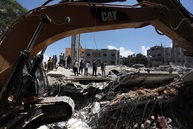
Activists in Britain are planning to block an Israel-linked arms factory to mark one year since Israel's devastating assault on the Gaza Strip. In what organisers are billing as "the biggest, most beautiful action" ever seen at a UK arms factory, buses of activists from around the country will descend on Shenstone in the West Midlands on July 6 for "a day of creative action in solidarity with Palestine."
Last August, during Israel's attack on Gaza, activists occupied the roof of the UAV Engines Ltd factory in Shenstone, which is owned by the Israeli arms company Elbit Systems. The drone engine factory was shut for two days as a result, which activists claim cost the company more than £180,000.
Elbit-produced drones are used by the Israeli military, and were used to conduct attacks during 'Operation Protective Edge'.
A year on, and activists plan to 'Block the factory' on July 6, "transforming the space around the arms factory...into a fun, creative and child-friendly environment." The focus is on "an inclusive and family friendly affair", activists say.
The planned action is "part of the wider Boycott, Divestment and Sanctions campaign (BDS) and the Stop Arming Israel Campaign", with the latter urging "the UK to end its extensive collaboration with the Israeli weapons industry and to institute a two-way arms embargo."
Organisers note how "anger and disbelief over last year's massacre led to widaespread and creative forms of resistance", including "mass demonstrations, occupations of government buildings and complicit businesses, and growing public pressure on governments and arms companies to stop arming Israel." The intention is for July 6 to be a continuation of such efforts.
Last August, during Israel's attack on Gaza, activists occupied the roof of the UAV Engines Ltd factory in Shenstone, which is owned by the Israeli arms company Elbit Systems. The drone engine factory was shut for two days as a result, which activists claim cost the company more than £180,000.
Elbit-produced drones are used by the Israeli military, and were used to conduct attacks during 'Operation Protective Edge'.
A year on, and activists plan to 'Block the factory' on July 6, "transforming the space around the arms factory...into a fun, creative and child-friendly environment." The focus is on "an inclusive and family friendly affair", activists say.
The planned action is "part of the wider Boycott, Divestment and Sanctions campaign (BDS) and the Stop Arming Israel Campaign", with the latter urging "the UK to end its extensive collaboration with the Israeli weapons industry and to institute a two-way arms embargo."
Organisers note how "anger and disbelief over last year's massacre led to widaespread and creative forms of resistance", including "mass demonstrations, occupations of government buildings and complicit businesses, and growing public pressure on governments and arms companies to stop arming Israel." The intention is for July 6 to be a continuation of such efforts.

The Palestinian NGO Network has warned of the sharp exacerbation in the humanitarian state of affairs in the blockaded Gaza Strip due to last summer’s Israeli offensive and the tough blockade.
Head of the NGO Network, Khalil Abu Shamala, said during a press conference held in Gaza: “The humanitarian state of affairs in the Gaza Strip is going from bad to worse due to the serious repercussions of the latest Israeli offensive and the ongoing blockade imposed on the enclave.”
“The tough Israeli blockade is the main reason behind the crises rocking the Strip, namely poverty, unemployment, and food insecurity, each of which has reached unprecedented levels,” he further warned.
Abu Shamala spoke up against the UN-run reconstruction process, saying it has rather deepened the crisis by imposing a set of conditions and restrictions as regards the access of rebuilding materials.
The NGO Network, comprising 133 member organizations, called on the UN and the international community to assume their ethical and legal responsibilities vis-à-vis the tragedy rocking the besieged coastal enclave.
For her part, Norwegian People's Aid Secretary General Liv Tørres expressed her disappointment over and condemnation of the ongoing Israeli blockade on Gaza, urging the international community to immediately step in and work on lifting the siege at the soonest time possible.
She branded the situation in Gaza “catastrophic”, especially that 80% of Palestinians in the Strip are left at the mercy of foreign aid.
A report conducted earlier this month by the Palestinian Central Bureau of Statistics found out that unemployment rates have gone up as high as 43% while the poverty rate has hit 38.8% in the Gaza Strip.
Head of the NGO Network, Khalil Abu Shamala, said during a press conference held in Gaza: “The humanitarian state of affairs in the Gaza Strip is going from bad to worse due to the serious repercussions of the latest Israeli offensive and the ongoing blockade imposed on the enclave.”
“The tough Israeli blockade is the main reason behind the crises rocking the Strip, namely poverty, unemployment, and food insecurity, each of which has reached unprecedented levels,” he further warned.
Abu Shamala spoke up against the UN-run reconstruction process, saying it has rather deepened the crisis by imposing a set of conditions and restrictions as regards the access of rebuilding materials.
The NGO Network, comprising 133 member organizations, called on the UN and the international community to assume their ethical and legal responsibilities vis-à-vis the tragedy rocking the besieged coastal enclave.
For her part, Norwegian People's Aid Secretary General Liv Tørres expressed her disappointment over and condemnation of the ongoing Israeli blockade on Gaza, urging the international community to immediately step in and work on lifting the siege at the soonest time possible.
She branded the situation in Gaza “catastrophic”, especially that 80% of Palestinians in the Strip are left at the mercy of foreign aid.
A report conducted earlier this month by the Palestinian Central Bureau of Statistics found out that unemployment rates have gone up as high as 43% while the poverty rate has hit 38.8% in the Gaza Strip.
28 june 2015

The Israeli occupation army said it would start on Sunday a large-scale military maneuver in border areas around the Gaza Strip.
In a press release on Saturday, the occupation army added that there would be an intensive movement of military vehicles and troops in the maneuver areas.
It claimed that the maneuver had already been planned as part of its 2015 training program to maintain the military readiness of its troops.
In a press release on Saturday, the occupation army added that there would be an intensive movement of military vehicles and troops in the maneuver areas.
It claimed that the maneuver had already been planned as part of its 2015 training program to maintain the military readiness of its troops.
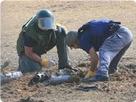
Sirens blare in Hof Ashkelon Regional Council in southern Israel; IDF: launched rocket seems to have landed in Gaza Strip.
Code red sirens were heard in the Hof Ashkelon Regional Council late Sunday morning when the IDF confirmed observing a launch, but said that the rocket had seemingly landed inside the Gaza Strip.
The siren heard in Hof Ashkelon marked the fourth rocket fired at Israel in the last three weeks. Just last week the Israeli Air Force struck a target in the northern Gaza Strip after a rocket attack from Gaza.
A number of rockets were fired at Israel from Gaza in the last few weeks. On June 11, a siren sounded in the Ashkelon area, also around 10 PM. The IDF later announced that the siren was prompted by a rocket launch from Gaza that landed inside the Strip.
Around 9:30 PM on June 6, a rocket exploded in an open area in Ashkelon, after which the AIF struck terror infrastructure in the northern Gaza Strip.
Gaza has recently seen attempts by Salafists to challenge Hamas rule and fire rockets despite the existing ceasefire. A senior Salafist leader in Gaza said his people could not tolerate the reality of Hamas persecuting, arresting, and killing them.
He added that the militants intended to continue firing rockets at Israeli targets, but claimed the intention was to trigger a civil war with Hamas -- not to drag the Palestinians into another conflict with Israel.
Israel claims rocket was fired from Gaza into Ashkelon
Walla Israeli website on Sunday said that warning sirens went off in Askalan (Ashkelon) shores, while initial Israeli reports claimed that a rocket was launched from Gaza into Israel.
No injuries or damages were reported.
Israeli sources four days ago as well said that a rocket was fired from Gaza into occupied Askalan (Ashkelon) south Israel, with no injuries reported. Hours later, IOF have shelled agricultural lands in Beit Hanoun north Gaza.
About three weeks ago, Several massive explosions rocked the Gaza Strip amid multiple reports of Israeli military airplanes buzzing the area.
The attack followed reports that two rockets were launched from Gaza into Israel by a Salafist group affiliated to ISIS, which later claimed responsibility for the attack.
Code red sirens were heard in the Hof Ashkelon Regional Council late Sunday morning when the IDF confirmed observing a launch, but said that the rocket had seemingly landed inside the Gaza Strip.
The siren heard in Hof Ashkelon marked the fourth rocket fired at Israel in the last three weeks. Just last week the Israeli Air Force struck a target in the northern Gaza Strip after a rocket attack from Gaza.
A number of rockets were fired at Israel from Gaza in the last few weeks. On June 11, a siren sounded in the Ashkelon area, also around 10 PM. The IDF later announced that the siren was prompted by a rocket launch from Gaza that landed inside the Strip.
Around 9:30 PM on June 6, a rocket exploded in an open area in Ashkelon, after which the AIF struck terror infrastructure in the northern Gaza Strip.
Gaza has recently seen attempts by Salafists to challenge Hamas rule and fire rockets despite the existing ceasefire. A senior Salafist leader in Gaza said his people could not tolerate the reality of Hamas persecuting, arresting, and killing them.
He added that the militants intended to continue firing rockets at Israeli targets, but claimed the intention was to trigger a civil war with Hamas -- not to drag the Palestinians into another conflict with Israel.
Israel claims rocket was fired from Gaza into Ashkelon
Walla Israeli website on Sunday said that warning sirens went off in Askalan (Ashkelon) shores, while initial Israeli reports claimed that a rocket was launched from Gaza into Israel.
No injuries or damages were reported.
Israeli sources four days ago as well said that a rocket was fired from Gaza into occupied Askalan (Ashkelon) south Israel, with no injuries reported. Hours later, IOF have shelled agricultural lands in Beit Hanoun north Gaza.
About three weeks ago, Several massive explosions rocked the Gaza Strip amid multiple reports of Israeli military airplanes buzzing the area.
The attack followed reports that two rockets were launched from Gaza into Israel by a Salafist group affiliated to ISIS, which later claimed responsibility for the attack.
Truce violations List of names Pictures of martyrs
Days: Aug: 26 - 25 - 24 - 23 - 22 - 21 - 20 - 19 - 18 - 17 - 16 - 15 - 14 - 13 - 12 - 11 - 10 - 9 - 8 - 7 - 6 - 5 - 4 - 3 - 2 - 1
July: 31 - 30 - 29 - 28 - 27 - 26 - 25 - 24 - 23 - 22 - 21 - 20 - 19 - 18 - 17 - 16 - 15 - 14 - 13 - 12 - 11 - 10 - 9 - 8
